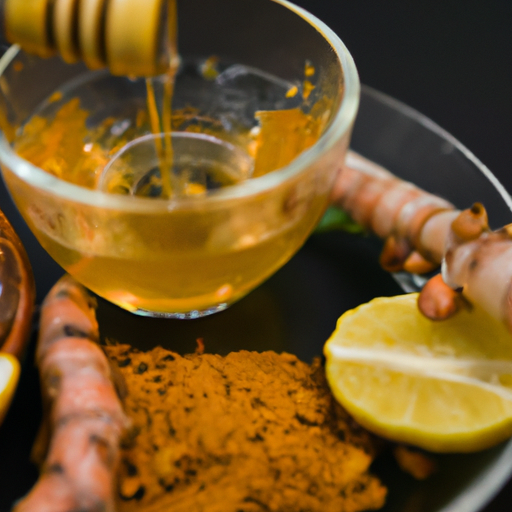As someone who enjoys turmeric tea, I was interested to find out if this colorful beverage could potentially harm my teeth. Although turmeric tea is praised for its numerous health benefits, its vivid orange-yellow hue has sparked concerns about potential teeth staining.
After conducting some research, I am here to share my findings on whether turmeric tea can indeed stain your teeth. Turmeric tea has been a popular beverage in Ayurvedic medicine for centuries due to its anti-inflammatory and antioxidant properties. These benefits have made it a trendy drink in recent years, and its popularity has only continued to grow.
However, with any food or drink that has a bright color, there is always a concern that it could cause staining. So, does turmeric tea fall into this category? Let’s explore the science behind teeth staining and the color of turmeric to find out.
Key Takeaways
- Turmeric tea has numerous health benefits, such as anti-inflammatory and antioxidant properties, reducing inflammation in the body, protecting against chronic diseases, and potential benefits for oral health.
- Teeth staining can be caused by chromogens in coffee, tea, red wine, and berries, as well as high acidity foods like citrus fruits, tomatoes, and vinegar.
- To prevent teeth staining from turmeric tea, it is recommended to brush teeth twice a day with whitening toothpaste, use a straw when drinking staining beverages, avoid brushing teeth immediately after drinking turmeric tea, choose the right toothbrush, and incorporate calcium and vitamin D into the diet.
- Teeth whitening methods include in-office whitening, at-home whitening trays, whitening strips, whitening toothpaste, and natural remedies. However, it is important to note that turmeric may interact with certain medications and should be avoided by people with gallbladder problems, and it is recommended to start with small amounts and consult with a healthcare provider before incorporating it into the diet.
Brief Overview of Turmeric Tea
If you’re looking for a healthy and flavorful beverage, turmeric tea is a fantastic option that has been enjoyed for centuries. Not only does it have a rich history in traditional medicine, but it also has numerous health benefits that make it a popular choice among health enthusiasts today.
Turmeric tea benefits include its anti-inflammatory and antioxidant properties, which can help reduce inflammation in the body and protect against chronic diseases. When brewing turmeric tea, it’s important to use high-quality turmeric powder and let it steep for at least 5-10 minutes to allow the flavor and nutrients to fully infuse into the water. Adding a pinch of black pepper can also enhance the absorption of curcumin, the active compound in turmeric.
Now, let’s take a look at what causes teeth staining and whether turmeric tea is a culprit.
What Causes Teeth Staining?
You may not realize it, but certain foods and drinks can gradually discolor the enamel on your teeth. This discoloration happens when the pigments in these foods and drinks stick to the enamel. Over time, these pigments accumulate and cause the teeth to look yellow or brown. This process is known as extrinsic staining and can be prevented by avoiding certain foods and drinks that are known to cause discoloration.
Some of the common foods that can cause discoloration include coffee, tea, red wine, and berries. These foods contain chromogens, which are pigments that can stick to the enamel. In addition, foods that are high in acidity can also cause discoloration by eroding the enamel and exposing the dentin underneath. Examples of acidic foods include citrus fruits, tomatoes, and vinegar. By avoiding these foods and drinks or consuming them in moderation, you can help prevent extrinsic staining and keep your teeth looking their best.
As we move on to the next section about the science behind turmeric’s color, it’s important to note that this spice has also been known to cause teeth staining. However, the extent to which turmeric tea stains teeth is still up for debate.
The Science Behind Turmeric’s Color
Imagine the vibrant orange color of a freshly grated turmeric root, which comes from a compound called curcumin that’s responsible for its distinctive hue. Turmeric’s pigmentation is a result of its chemical composition, which contains curcuminoids that are highly pigmented. These curcuminoids have been used in the food industry for centuries to add color to products such as mustard, cheese, and beverages.
In addition to its application in the food industry, turmeric also has numerous health benefits due to its anti-inflammatory and antioxidant properties. Its color perception has also been the subject of food science research. Studies have shown that the perception of color can affect our perception of flavor.
With this understanding of turmeric’s pigmentation and its role in the food industry and health, we can now explore whether or not turmeric tea has the potential to stain our teeth.
(Note: The subsequent section will address the question of whether or not turmeric tea stains teeth.)
Can Turmeric Tea Stain Your Teeth?
Get ready to discover if sipping on this vibrant and flavorful beverage could leave an unwanted mark on your pearly whites. As a regular drinker of turmeric tea, I was curious to find out if it could potentially stain my teeth. After doing some research, I found that while turmeric does have a strong pigment that can stain clothing and surfaces, it is unlikely to cause significant staining on teeth. In fact, some studies suggest that turmeric may even have benefits for oral health, such as reducing inflammation and promoting healthy gums.
To further emphasize this point, let’s take a look at the table below:
| Substance | Staining Potential |
|---|---|
| Coffee | High |
| Red Wine | High |
| Turmeric | Low |
As you can see, while coffee and red wine have high staining potential, turmeric falls into the low category. Of course, this does not mean that turmeric tea cannot cause any staining at all – it is always important to practice good oral hygiene and be mindful of the foods and drinks we consume. However, incorporating natural teeth remedies, such as brushing with baking soda or using a straw when drinking staining beverages, can also help prevent any potential staining.
Moving on to the next section, let’s explore some practical tips on how to prevent staining and keep your teeth looking bright and healthy.
How to Prevent Staining
To prevent staining from turmeric tea, I’ve found that proper brushing and flossing techniques are essential. It’s important to brush your teeth twice a day with a whitening toothpaste to remove surface stains and prevent them from setting in.
Additionally, drinking through a straw can help minimize contact between the tea and your teeth, reducing the likelihood of staining.
Proper Brushing and Flossing
You need to brush and floss your teeth properly to prevent staining from turmeric tea. Proper brushing and flossing are essential to remove any residue left on your teeth after consuming turmeric tea. Timing is also important when it comes to brushing, as brushing too soon after drinking the tea can actually cause the stains to set in deeper. Wait at least 30 minutes after drinking before brushing your teeth to allow the saliva in your mouth to neutralize the acid and to give the stains time to soften.
Choosing the right toothbrush is also crucial. A soft-bristled toothbrush can effectively remove any stains without damaging your enamel or gums. Hard-bristled toothbrushes can actually cause more harm than good, as they can cause sensitivity and even receding gums.
In addition, make sure to brush gently and in circular motions, focusing on each individual tooth. By taking these simple steps, you can prevent staining from turmeric tea and maintain a healthy, bright smile. Moving forward, drinking through a straw can also help prevent any future staining.
Drinking Through a Straw
If you want to avoid potential staining, consider using a straw when drinking your favorite beverages. I’ve found that using a straw has been helpful in minimizing exposure of my teeth to various liquids, including turmeric tea. By doing so, I can still enjoy my turmeric tea without worrying about the discoloration it may cause on my teeth.
Here are two sub-lists to add depth to this tip of using a straw:
-
Benefits of using a straw:
-
Minimizes contact of the beverage with your teeth
-
Helps to prevent staining and discoloration
-
Types of straws to consider:
-
Reusable straws made from materials such as silicone or metal
-
Biodegradable straws made from materials such as paper or bamboo
Using a straw is just one way to prevent staining on your teeth. If you’re still looking for additional ways to maintain a bright smile, consider using a whitening toothpaste.
Using a Whitening Toothpaste
Achieving a brighter smile can be done by incorporating a whitening toothpaste into your daily dental routine. Whitening toothpaste typically contains abrasive particles or chemicals, such as hydrogen peroxide, that help to remove surface stains from teeth. When used consistently over time, these toothpastes can make a noticeable difference in the brightness of your smile.
However, it’s important to note that whitening toothpaste isn’t a substitute for professional dental procedures and may not be effective for removing deeper stains or discoloration.
In addition to using a whitening toothpaste, there are other natural remedies that can help minimize staining on teeth. These include drinking through a straw, as discussed in the previous subtopic, as well as consuming foods high in calcium and vitamin D, which can strengthen tooth enamel.
It’s important to maintain good oral hygiene habits, such as brushing twice a day and flossing, to prevent buildup of plaque and tartar that can contribute to staining. By incorporating these strategies into your dental routine, you can help keep your teeth looking bright and healthy.
Natural Remedies to Minimize Staining
To prevent your pearly whites from turning yellow like the sun, try incorporating lemon juice into your turmeric tea as a natural bleach, like a ray of sunshine on your teeth.
Lemon juice is acidic and has natural bleaching properties that can help minimize staining from turmeric. You can also try mixing turmeric with coconut oil, which has been shown to have antibacterial properties that can help prevent plaque buildup and yellowing.
When it comes to DIY remedies for teeth whitening, it’s important to remember that while natural remedies can be effective, they may not provide the same results as professional treatments.
If you’re looking for a more dramatic improvement in the color of your teeth, you may want to consider professional teeth whitening treatments. These can be done in-office or with at-home kits, and can provide significant improvement in the appearance of your teeth.
Professional Teeth Whitening
Natural remedies can only do so much in minimizing the staining caused by turmeric tea. If you want a more effective and long-term solution, you might want to consider professional teeth whitening. This method involves the use of bleaching agents to remove stains and discolorations from the teeth. It is a safe and reliable way to brighten your smile and restore your confidence.
However, professional teeth whitening can be expensive and may not be covered by insurance. The cost can vary depending on the type of treatment and the dental clinic you choose. To help you make an informed decision, here is a cost comparison table for some of the most common teeth whitening methods:
| Method | Cost Range |
|---|---|
| In-office whitening | $500-$1,000 |
| At-home whitening trays | $300-$500 |
| Whitening strips | $20-$100 |
| Whitening toothpaste | $5-$15 |
| Natural remedies | $0-$10 |
Keep in mind that the cost should not be the only factor to consider when choosing a teeth whitening method. You should also consider the effectiveness, safety, and potential side effects. Consult your dentist to determine the best teeth whitening option for you.
Professional teeth whitening may be a great option for those who want to remove stubborn stains caused by turmeric tea. However, if you prefer a more natural approach, there are also other health benefits of turmeric tea that you can explore.
Other Health Benefits of Turmeric Tea
Aside from its teeth-staining properties, turmeric tea offers a plethora of health benefits that you may want to explore. Drinking turmeric tea has been linked to improved digestion and can help alleviate symptoms of gastrointestinal discomfort such as bloating and gas. This is due to the anti-inflammatory and antioxidant properties of curcumin, the active compound found in turmeric. Curcumin has been shown to reduce inflammation in the gut, which can help improve digestive function.
In addition to its benefits for digestion, turmeric tea can also boost immunity. Curcumin has been found to have antimicrobial and antiviral properties that can help prevent infections and reduce inflammation in the body. Additionally, turmeric tea contains high levels of antioxidants, which can help protect cells from damage caused by free radicals.
Incorporating turmeric tea into your daily routine can be a great way to support both your digestive health and immune system.
Moving into the subsequent section about risks and side effects, it’s important to note that while turmeric tea has many benefits, it can interact with certain medications and may not be suitable for everyone. It’s always best to consult with a healthcare professional before incorporating any new supplement or beverage into your routine.
Risks and Side Effects
If you’re considering incorporating turmeric into your diet, it’s important to be aware of the potential risks and side effects. While turmeric is generally safe when taken in recommended doses, consuming large amounts may cause gastrointestinal problems such as nausea, diarrhea, and stomach upset.
Additionally, turmeric may interact with certain medications, such as blood thinners, and should be avoided by people with gallbladder problems. To avoid any potential risks, precautionary measures should be taken when consuming turmeric.
It’s recommended to start with small amounts and gradually increase the dosage over time. Also, be sure to consult with a healthcare provider before incorporating turmeric into your diet, especially if you have any underlying medical conditions or are taking medications.
By being aware of the potential risks and taking necessary precautions, you can safely enjoy the health benefits of turmeric tea.
Frequently Asked Questions
What are the other health benefits of turmeric tea besides teeth staining prevention?
As someone who drinks turmeric tea regularly, I can attest to its numerous health benefits. Turmeric contains powerful anti-inflammatory properties and can boost your immune system. Beyond teeth staining prevention, it’s a great addition to any wellness routine.
Are there any risks or side effects associated with drinking turmeric tea?
Before adding turmeric tea to your routine, it’s important to know about its possible risks and side effects. Prevalence studies suggest some people may experience digestive issues or allergic reactions. Additionally, the chemical composition of turmeric may interact with certain medications. Consult with a healthcare professional before consuming turmeric tea.
Can turmeric tea be used as a natural teeth whitening method?
I have found that turmeric tea can be used as a natural teeth whitening method. To make a beginner-friendly recipe, mix 1 tsp of turmeric powder with 1 cup of warm water and swish in your mouth for 5-10 minutes. Repeat weekly for best results.
How often should turmeric tea be consumed in order to see noticeable benefits?
Turmeric tea frequency is subjective to personal preference, but optimal consumption is 1-2 cups per day. Long term use can provide anti-inflammatory and antioxidant effects, but consult with a healthcare professional before use.
Is it safe to consume turmeric tea if you have existing dental issues or sensitivities?
As someone coping with sensitivity, I’ve found that turmeric tea can be a great addition to my routine as it may help support gum health. However, it’s important to consult with your dentist before consuming if you have existing dental issues.
Conclusion
Overall, I’ve found that turmeric tea can stain your teeth. However, there are ways to prevent or minimize the staining. For example, using a straw, rinsing your mouth with water after drinking, and brushing your teeth regularly. Additionally, natural remedies like baking soda and apple cider vinegar can help to reduce staining.
Despite the potential for staining, turmeric tea offers numerous health benefits. These include anti-inflammatory and antioxidant properties. It has also been shown to improve brain function and reduce the risk of heart disease.
As with any supplement or food, it’s important to talk to your doctor before incorporating turmeric tea into your diet. And to maintain healthy teeth, practice good oral hygiene.










